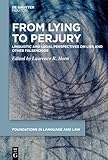From Lying to Perjury : Linguistic and Legal Perspectives on Lies and Other Falsehoods / ed. by Laurence R. Horn.
Material type: TextSeries: Foundations in Language and Law [FLL] ; 3Publisher: Berlin ; Boston : De Gruyter Mouton, [2022]Copyright date: ©2022Description: 1 online resource (VIII, 411 p.)Content type:
TextSeries: Foundations in Language and Law [FLL] ; 3Publisher: Berlin ; Boston : De Gruyter Mouton, [2022]Copyright date: ©2022Description: 1 online resource (VIII, 411 p.)Content type: - 9783110738391
- 9783110733815
- 9783110733730
- 345.0234 23/eng/20220719
- BJ1421 .H67 2022
- online - DeGruyter
- Issued also in print.
| Item type | Current library | Call number | URL | Status | Notes | Barcode | |
|---|---|---|---|---|---|---|---|
 eBook
eBook
|
Biblioteca "Angelicum" Pont. Univ. S.Tommaso d'Aquino Nuvola online | online - DeGruyter (Browse shelf(Opens below)) | Online access | Not for loan (Accesso limitato) | Accesso per gli utenti autorizzati / Access for authorized users | (dgr)9783110733730 |
Frontmatter -- Contents -- Introduction: On lying and disleading -- I Lies and deception: The landscape of falsehood -- Lying, deception, and related concepts: A conceptual map for ethics -- The morality of deception -- Kant tell an a priori lie -- II Lying, deception, and speaker commitment: Empirical evidence -- Is lying morally different from misleading? An empirical investigation -- “I was only quoting”: Shifting viewpoint and speaker commitment -- Memefying deception and deceptive memefication: Multimodal deception on social media -- III Puffery, bluffery, bullshit: How to not quite lie -- Bald-faced bullshit and authoritarian political speech: Making sense of Johnson and Trump -- Practice to deceive: A natural history of the legal bluff -- Just saying, just kidding: Liability for accountability-avoiding speech in ordinary conversation, politics and law -- IV Crossing the perjury threshold: Deceit and falsehood in the courtroom -- Perjury cases and the linguist -- Trickery and deceit: How the pragmatics of interrogation leads innocent people to confess – and factfinders to believe their confessions -- The context of mistrust: Perjury ascriptions in the courtroom -- What counts as a lie in and out of the courtroom? The effect of discourse genre on lie judgments -- Lies, deception, and bullshit in law -- Index
restricted access online access with authorization star
http://purl.org/coar/access_right/c_16ec
This volume provides new insights on lying and (intentionally) misleading in and out of the courtroom, a timely topic for scholarship and society. Not all deceptive statements are lies; not every lie under oath amounts to perjury—but what are the relevant criteria? Taxonomies of falsehood based on illocutionary force, utterance context and speakers’ intentions have been debated by linguists, moral philosophers, social psychologists and cognitive scientists. Legal scholars have examined the boundary between actual perjury and garden-variety lies. The fourteen previously unpublished essays in this book apply theoretical and empirical tools to delineate the landscape of falsehood, half-truth, perjury, and verbal manipulation, including puffery, bluffing, and bullshit. The papers in this collection address conceptual and ethical aspects of lying vs. misleading and the correlation of this opposition with the Gricean pragmatic distinction between what is said and what is implicated. The questions of truth and lies addressed in this volume have long engaged the attention of scholars in linguistics, philosophy, psychology, cognitive science, organizational research, and the law, and researchers from all these fields will find this book of interest.
Issued also in print.
Mode of access: Internet via World Wide Web.
In English.
Description based on online resource; title from PDF title page (publisher's Web site, viewed 25. Jun 2024)


